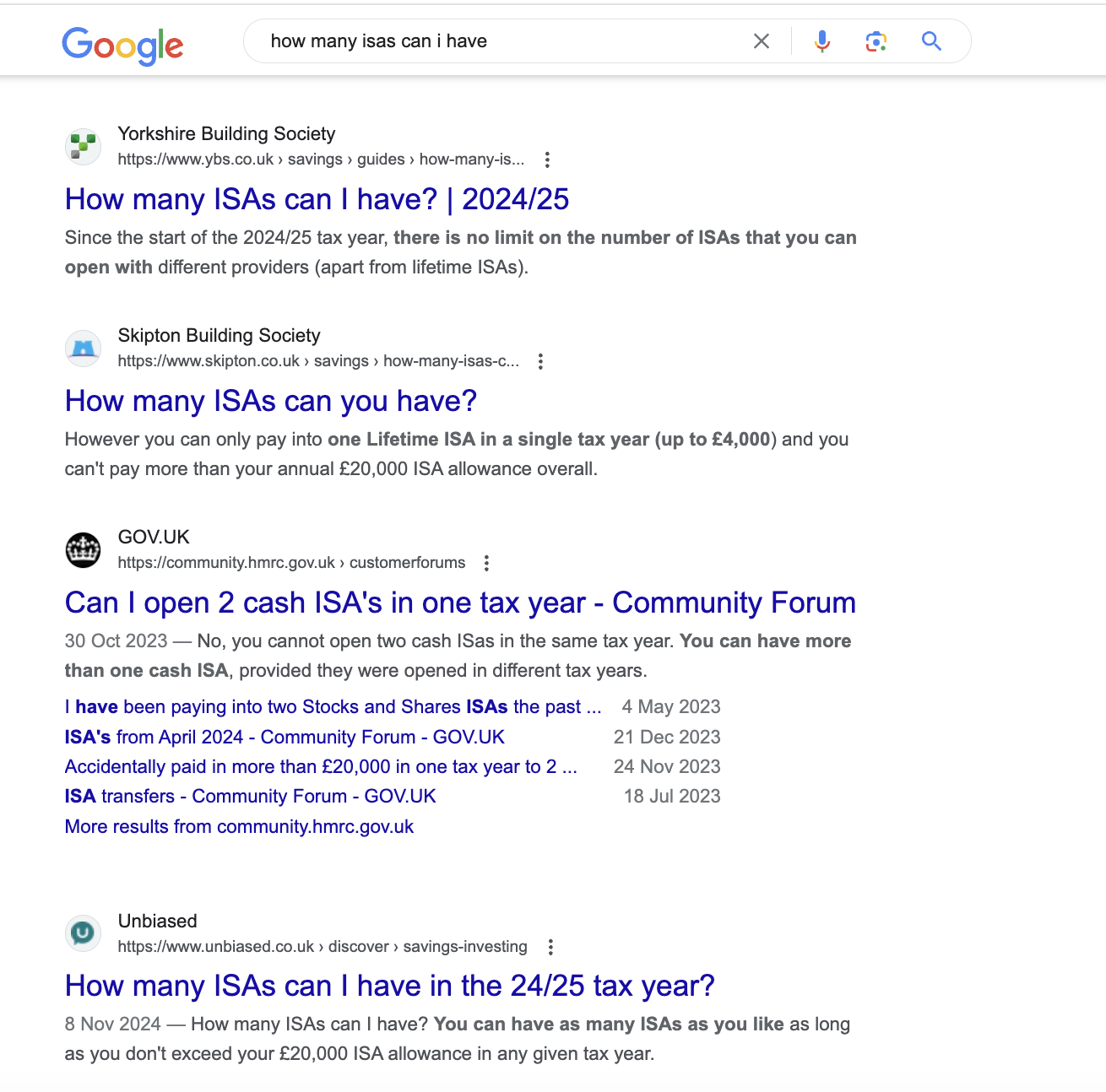Keyword Research: How to perform in depth keyword research in 2025

What is keyword research and why is it important for SEO?
Keyword research is the process of finding and analysing terms that people enter into search engines (i.e what you type into Google when searching for something). It's a crucial part of search engine optimisation (SEO). Not only does it help you understand what people are looking for online, it also provides insights on the language your audience uses and the topics they care about.
When done well, keyword research can help you maximise your content creation efforts by ensuring you are writing about what your audience cares about. Moreover it allows you to effectively optimise pages for search, consequently reaching your target audience.
Keyword research gives you insight into:
- What queries you should target
- How popular those queries are (how often are they searched for)
- How challenging it will be to appear on search for those queries
The article is long so if you are on the go - feel free to listen to this quick AI generated podcast on the topic.
What do you need to know before commencing keyword research?
1. Understand the business and target audience
Before you can start researching what people are typing into search, you need to have a thorough understanding of the business you're working with and its target audience.
Answer these questions:
- What are their demographics (age, gender, location, income, education level)?
- What is their lifestyle or daily routine?
- What challenges or pain points do they face?
- Are they aware of these challenges, or do they need education on the issue?
- How urgent are these problems to them?
- What motivates or drives them?
- What goals are they trying to achieve?
- What outcomes would they value most from a solution like yours?
- How do they gather information?
- Do they prefer detailed guides, quick answers, or visual content?
- What stage of the buying journey are they in? (i.e. are they just becoming aware of a problem or solution (awareness stage)? or are they actively comparing options (consideration stage)?
- What language or terminology do they use? (i.e. Are they likely to use technical jargon, industry-specific terms, or simple language?)
- Do they search for localised or culturally specific terms?
- Are there specific times of the year when they are more likely to search for your solution?
This understanding will help form the foundation of your keyword research strategy.
2. Think of topics, not just keywords
While keywords are important, it's crucial to shift your mindset from individual keywords to broader topics. This approach is crucial for modern SEO because it helps you create comprehensive content that satisfies user intent and targets a wider audience.
For example, if someone searches for "ISAs" they might also use terms like "ISA account", "best ISA account", "ISA allowance", "How many ISAs can I have". By creating a comprehensive guide that focuses on ISAs as a topic you can potentially rank for all of these keywords and more.
- Keywords are part of broader topics: Keywords, especially long-tail keywords, often represent specific sub-topics within a broader subject area. Instead of creating separate content for each long-tail keyword, you can create long-form content that covers the entire topic in depth and naturally ranks for those long-tail keywords.

- Grouping keywords into topic clusters: Keyword clustering involves grouping related keywords together based on shared themes and intent. This process allows you to create content hubs, with pillar content targeting broader keywords and cluster content addressing more specific sub-topics. By interlinking these pieces of content, you strengthen the relationships between them and signal to search engines that your website is an authority on that particular topic.
- Shift from keywords to topicality: Search engines like Google are increasingly sophisticated in understanding the relationships between different concepts and topics. As a result, a well-structured website with comprehensive content on a particular subject is more likely to rank well for a variety of related keywords, even those not explicitly used in the content.
- Beyond keyword research tools: While keyword research tools are essential for gathering data and identifying relevant keywords, they shouldn't be the sole driver of your content strategy. Thinking in terms of topics requires you to understand the nuances of your industry, your target audience, and their search behaviour. For example if you are a supplement brand selling products that help balance female hormones, you could research topics like stress hormones, diet plans, menstrual cycle, peri-menopause, etc..
Example: Initial keyword research on for the topic "natural remedies for PMS". Note - this is not extensive and there is significantly more search volume that could be targeted with this topic.

Table search volume and keyword difficulty data is for the US
Consider search intent
Understanding user intent is critical for effective keyword research. Search intent refers to the reason behind a user's search. Are they seeking information, looking to buy a product, or trying to navigate to a specific website? Identifying search intent helps you create content that aligns with user expectations, resulting in higher engagement and better rankings.
How does search intent influence keyword selection?
Search intent is a critical factor in keyword selection because it determines the type of content that will satisfy the user’s needs.
- Understanding intent to match content: For instance, if someone searches for "how to start a blog," you need to discern whether they're looking to learn how to write individual blog posts or how to set up an entire blog website. To verify the user's intent, input the keyword yourself and observe the results to see if they match your content's purpose.
- Aligning keyword choice with user needs: The reason a user types in a particular keyword holds significant weight in SEO. Content should aim to resolve user problems. If you are writing an article about "How to start a business" it's crucial to anticipate the questions users might have on that topic so you can provide the answers within the content.
- Content format based on intent: Different search intents necessitate different content formats. For instance, a transactional keyword like “buy collagen supplement” would be best targeted with a product page, while an informational keyword like “what are the different types of collagen” would be better suited for a blog post or guide.
What are the steps for performing great keyword research?
1. Define your goals and target audience
- Business objectives: Clearly define your SEO goals. Do you want to increase brand awareness, drive traffic to specific product pages, generate leads, or boost sales?
- Target audience: Identify your ideal customers or visitors. What are their interests, pain points, and demographics? Understanding your target audience will help you choose relevant keywords and create content that resonates with them.
2. Brainstorm seed keywords
- Initial ideas: Start with a list of broad keywords related to your niche or business. Consider what people might type into search engines to find your products, services or pain points they are experiencing. For example, if you sell supplements, your seed keywords might be:
- vitamin d supplements - US monthly search volume 9.9K
- gut health supplement - US monthly search volume 12.1K
- hormone digestive system - US monthly search volume 1.9K
- intestinal health supplements - US monthly search volume 1K
- anti bloating supplements - US monthly search volume 320
- Competitor research: Analysing your competitors' keywords is a valuable technique for identifying potential opportunities and understanding the competitive landscape. Tools like SEMRush's Keyword Gap tool and Ahrefs' Site Explorer allow you to compare your keyword profile with that of your competitors, revealing keywords they are targeting that you might be missing. Moreover, this information can help you prioritise keywords that are already driving traffic to your competitors and identify gaps in your content strategy.
- Analyse pages ranking on Google for your key terms: Analyse what other keywords pages that are ranking on search for your most important keywords are also coming up for. This will help you uncover semantic keywords
- Explore other sources: Look beyond traditional keyword research tools and explore platforms like Reddit, Forums, and Amazon to understand how your target audience uses language and searches for information.
3. Expand your keyword list
- Keyword research tools: Use tools like Google Keyword Planner, SEMRush, or Ahrefs to generate more keyword ideas based on your seed keywords. These tools offer features like keyword suggestions, related searches, and question keywords to expand your list.
- Search engine suggestions: Pay attention to Google's autocomplete suggestions and "People also ask" boxes for additional keyword ideas.
- Consider keyword variations: Include different variations of your keywords, such as singular/plural forms, synonyms, and related terms. This helps you capture traffic from a wider range of search queries.
4. Group keywords into topic clusters
- Organise by parent topics: Identify the main topics and sub-topics covered by your keywords. Group related keywords together to create content hubs or topic clusters, ensuring a structured and comprehensive approach to your content strategy.
- Consider content formats: Determine the most appropriate content formats for each keyword cluster based on search intent. For example, informational keywords might require blog posts or guides, while transactional keywords might be best targeted with product pages.
How do you prioritise keywords strategically?
Not all keywords are going to deliver results for your business, so it's essential to prioritise them based on their relevance, potential, and feasibility. Focus on keywords that align with your business goals, have a reasonable search volume, and aren't overly competitive. Especially if your site and brand are young and haven't built authority yet.
Key metrics for analysing keyword viability and aid with prioritisation
To analyse keyword viability for SEO, you need to assess the potential of different keywords to drive traffic and achieve business objectives. This involves considering various metrics that provide insights into a keyword's popularity, competition, and relevance to your target audience. Here are some key metrics for analysing keyword viability, based on the information provided in the sources:
- Search Volume: Search volume is a fundamental metric that indicates how many times, on average, a specific keyword is searched per month. Higher search volume suggests greater potential for attracting traffic, but it doesn't guarantee success.
- Clicks: While search volume gives an overall picture of a keyword's popularity, the number of actual clicks it receives provides a more accurate measure of potential traffic. Some keywords might have high search volume but low clicks, especially if they trigger SERP features that provide answers directly on the search results page, reducing the need for users to click through to websites.
- Keyword Difficulty: Keyword difficulty (KD) measures how challenging it would be to rank in the top 10 organic search results for a particular keyword. Higher KD scores suggest greater competition, requiring more effort and resources to achieve top rankings. This doesn't mean it's impossible, but it will require more effort and time.
- Cost-Per-Click (CPC): CPC, primarily an advertising metric, can also offer insights into a keyword's value from an SEO perspective. It represents the amount advertisers are willing to pay for a click on an ad for that keyword. Higher CPC often indicates greater commercial intent, suggesting that users searching for that keyword are more likely to convert into customers or leads. While CPC doesn't directly correlate to organic ranking potential, it can help you identify keywords that might have a high volume of ads appearing but that also might be more profitable to target.
- Search trends and seasonality: Analysing the historical trends of a keyword's search volume can reveal its long-term popularity and potential for growth. Tools like Google Trends show how interest in a particular keyword has changed over time, highlighting any seasonal fluctuations or emerging trends. Understanding these patterns can help you anticipate future demand and create content that aligns with the evolving interests of your target audience.
- Relevance and search intent: Keyword relevance goes beyond simply matching the words used in a search query. It involves understanding the user's intent behind that query. Different types of search queries, such as informational, navigational, commercial, and transactional, require different content formats and approaches. Analysing the SERP features for a keyword can also provide insights into search intent and help you determine the most effective content strategy.
- Consider SERP features: When analysing keywords, consider which SERP features are present for those keywords and how they might affect your content strategy. For instance, if a keyword triggers a featured snippet, optimising your content to win that snippet can significantly boost your visibility and traffic, even if you don't rank first organically. Conversely, if a keyword predominantly displays shopping results or local packs, it might not be suitable for targeting with informational content
Is your content plan based on what people are searching for? Do you create a vast amount of content but your organic traffic isn't growing? Get in touch
Contact Us
Additional resources on how to perform keyword research:
- https://www.semrush.com/academy/courses/keyword-research-course-with-greg-gifford/
- https://blog.hubspot.com/marketing/how-to-do-keyword-research-ht
- https://backlinko.com/tools/keyword
- https://mangools.com/blog/keyword-research/
- https://www.searchenginejournal.com/keyword-research/
- https://mangools.com/blog/keyword-research/
- https://www.semrush.com/blog/keyword-research/
- https://moz.com/keyword-research-guide
- https://ahrefs.com/blog/keyword-research/

